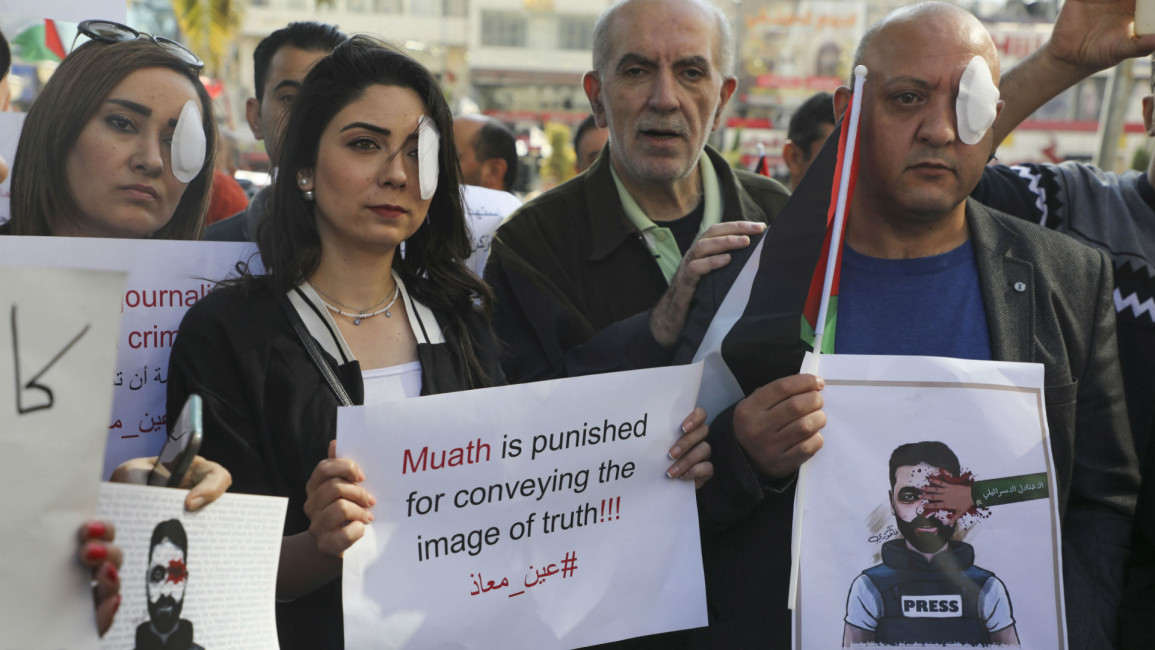#EyeofTruth: Palestinians patch up for journalist who lost eye in Israeli shooting
Muath Amarneh has been in an Israeli hospital since he was hit in the eye on Friday during clashes between Israeli border police and Palestinian demonstrators in the village of Surif, close to Hebron in the southern West Bank.
Dozens of Palestinian journalists rallied on Sunday - protesting with one eye covered in solidarity, while hundreds more, including celebrities, imitated the move online using the hashtags #MuathEye, #EyeofTruth and #We_are_MuathAmarneh in Arabic.
Amarneh, who is being treated in Hadassah Hospital in Jerusalem, said he was some way from the protesters when he was hit by what he believes was Israeli fire.
"After the clashes started, I was standing to the side wearing a flak jacket with press markings and a helmet," the freelance cameraman told AFP on Sunday.
Twitter Post
|
"Suddenly I felt something hit my eye, I thought it was a rubber bullet or a stone. I put my hand to my eye and found nothing."
"I couldn't see and my eye was completely gone.”
He said doctors at the hospital told him a fragment of metal, about 2 centimetres long, pierced the eye and settled behind it near the brain.
Amarneh's cousin Tareq, accompanying him in hospital, said doctors planned to extract the metal but changed their minds after discovering they could also damage the right eye or even trigger bleeding in the brain.
A spokesman for the Israeli police denied that the photographer was targeted, saying fire was "not directed at all" toward him.
"The security forces operated in the area in front of dozens of rioters, some of them masked, who threw stones at officers and burned tires," police spokesman Micky Rosenfeld said.
Read more: Israeli soldiers laughed as they shot him in the back. Now, he is speaking out
"The response by the forces was using non-lethal means in order to disperse the rioters."
Amarneh, who comes from the Dheisheh refugee camp near Bethlehem, claimed he was targeted as a journalist.
"There is an unnatural and ugly targeting of journalists," the father-of-two said.
Solidarity sit-in
Since the incident Palestinian journalists have launched a campaign, with protests in several cities in the West Bank.
In Bethlehem on Sunday, border police dispersed a sit-in by journalists at the checkpoint north of the city, an AFP journalist said.
Demonstrators wore eye patches and held signs aloft.
Tear gas canisters were fired by the border police, the journalist said.
Seven people were lightly wounded, according to Palestinian health officials.
In the city of Tulkarem, about 250 journalists took part in a sit-in to show solidarity, according to journalists present.
A video and photos of Amarneh spread immediately after his injury, with journalists trying to carry him with blood flowing from his left eye.
The Palestinian Journalists Syndicate says 60 journalists have been hit by live ammunition this year, the majority in Gaza - an enclave where violent weekly protests along the border often lead to dozens of demonstrators being wounded.
The report added that there are 170 cases of Israeli soldiers beating up, detaining journalists or blocking them from covering events.
Currently, there are 18 journalists inside Israeli prisons.
The syndicate also noted the ongoing Facebook crackdown against Palestinian media pages that monitor human rights abuses. The report said it has monitored 180 cases of violations against Palestinian content on Facebook, including the removal of Palestinian accounts or posts. 
Agencies contributed to this report.
Follow us on Twitter and Instagram to stay connected



